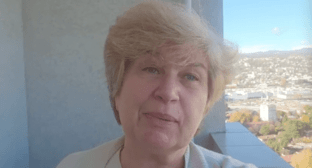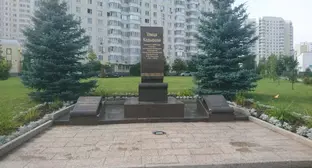21 November 2011, 12:30
Week in the Caucasus: review of main events of November 14-20
Non-recognition of the presidential election in South Ossetia (the second round to be held on November 27) by most countries in the world; struggle of North-Ossetian believers for their Orthodox priest; Catherine Ashton's visit to Southern Caucasus, accompanied by protests against human rights violations in Azerbaijan; State Duma election campaign, which in Southern Russia cannot do without scandals and protests, – look these and other events in the Caucasus in the review of the week of November 14-20, 2011, prepared by the "Caucasian Knot".
South Ossetia: date of the second round of presidential election, non-recognized by most of the world, appointed
On November 17, the Central Election Commission (CEC) of South Ossetia announced the final totals of the presidential election, according to which the majority in the first round was won by Anatoly Bibilov and Alla Djioeva – 6066 (24.86 percent) and 6052 (24.80 percent) votes, respectively. The remaining nine candidates (the final list of candidates had 11 persons) ended with less than 10 percent of votes. The second round of the election is scheduled for November 27.
On November 14, the Ministry of Foreign Affairs (MFA) of Georgia issued an official statement treating the November 13 presidential election in South Ossetia as "illegal". Non-recognition of this election was also stated by the Co-Rapporteurs of the Parliamentary Assembly of the Council of Europe (PACE) on monitoring Georgia's obligations, the European Union, NATO, USA, and Azerbaijan.
On November 14, Russia announced that the presidential election passed in South Ossetia without violations. International observers, in particular, from France, Israel and Transnistria qualified the election process in the republic as coherent.
North Ossetia: people manage to cancel transfer of their Orthodox priest to Dagestan
Orthodox Christians in North Ossetia opposed the transfer of Archimandrite Anthony, the Dean of the Alania Holy Dormition Men's Monastery, to Dagestan. The decision to transfer Father Anthony to Dagestan, made on November 15 by Archbishop of Vladikavkaz and Makhachkala Zosima, caused violent resentment among the Orthodox community of the republic. Mass protests against the decision of the Archbishop, involving hundreds of people, were held in the North-Ossetian capital for three days in a row.
The eparchy officials explained that the transfer of Father Anthony to be the Dean of the Orthodox churches of the Tarum District of Dagestan was caused by the need to strengthen the position of Orthodoxy in Dagestan, while Father Anthony would be recommended for election as Diocesan. However, believers said that they had got used to Anthony and would not welcome his departure.
On November 18, it was reported that the ROC (Russian Orthodox Church) had decided to leave Antony in North Ossetia. On November 19, the priest returned to North Ossetia; at the Beslan Airport he was met by more than 800 persons.
South Caucasus: Catherine Ashton visits Baku, Yerevan and Tbilisi
Catherine Ashton, the EU Commissioner for Foreign Affairs and Security Policy, has paid a regional visit to Southern Caucasus. Her Caucasian voyage started on November 15 in Baku; then, Ms Ashton went to Tbilisi, and after that she visited Armenia.
In Azerbaijan, Ms Ashton discussed the issue of Karabakh conflict settlement and cooperation in the sphere of energy. During a press conference, held together with the local Foreign Minister, the EU Commissioner stated the growth of Azerbaijan's authority in the region and the importance for the EU to respect human rights. Let us note here that Ms Ashton's visit was accompanied by a rally in Baku demanding to release political prisoners, which was dispersed by the police.
On November 16, during Catherine Ashton's stay in Baku, the Amnesty International presented a report entitled "Spring that never blossomed: freedom is suppressed in Azerbaijan ", which called on the international community "not to look through fingers" at numerous human rights violations in Azerbaijan, highlighting the presence in the country of "prisoners of conscience" – 17 persons convicted in connection with the protests in Baku earlier this spring.
In Georgia and Armenia, the main topic of Ashton's meetings was the free trade with the EU countries.
In Tbilisi, Catherine Ashton announced that the EU started negotiations with Georgia on a free trade agreement. The news was welcomed both by President of Georgia Mikhail Saakashvili and by Georgian experts – economists and political scientists. However, observers also noted that Catherine Ashton's visit to Tbilisi has once again marked the conflict between economic ideologies of Georgia and the EU. Thus, according to David Narmaniya, the head of the Institute for Economic and Financial Studies of Georgia, the present leadership of Georgia adheres to the principles of liberal economy, while the EU has a social-democratic model of economy.
In Yerevan, while discussing the issue of facilitating the visa regime between Armenia and the European Union, Ms Ashton said that in the near future she expected a substantial progress in this area, after solving many technical questions. The Armenian Foreign Minister, in his turn, said that the Armenian-EU relations were actively developing both in terms of high level visits, and in terms of negotiations about Armenia's associated membership, a free trade zone and visa facilitation.
Southern Russia: State Duma election campaign goes hand in hand with scandals and protests
Regions of Southern Russia are getting ready, like the rest of the country, for elections of State Duma deputies to be held on December 4, 2011. Thus, in Adygea, all the 263 precinct election commissions had been formed by November 11; and on November 17 they had all the ballot papers ready – in the amount of 340,200 units. In Dagestan, the Republic's Election Commission (REC) said that the voters' lists will contain over 1.5 million voters. Chechnya has launched – in view of the upcoming elections – three telephone "hotlines" for the voters – the Public Chamber of the Republic, the Ombudsman in the Chechen Republic and the NGO "Union of Progressive Youth and Students of the Chechen Republic".
November 18 gave a start to early voting, which takes place in remote and inaccessible areas of Russia.
During the last week, the election campaign was marked by a series of incidents and allegations of violations and abuse.
In particular, the Prosecutor's Office of Kalmykia has stated that in five villages of the Yashkul District the voters' lists contained long dead people, regular soldiers and prisoners.
In the Volgograd Region, the prior of the parish of Saints Peter and Paul Church in the Soviet District of Volgograd said that officials were meeting local priests and asked them to persuade their congregations to vote for the "Edinaya Rossiya" (United Russia) Party. Also in Volgograd, the leaders of the regional branch of the "Pravoe Delo" (Fair Cause) Party have cancelled the agreement on fair elections, explaining that their opponents had broken "all possible moral and ethical norms."
In the Rostov Region, on November 16, the work of seven polling stations was suspended, because of fire protection violations, identified by inspectors of the "Gospozhnadzor" (Russian Federal Agency for Fire Supervision); however, on the following day it became known that all the stations continued their work as usual, as all the violations had been eliminated.
In the Krasnodar Territory, the Election Commission issued a warning to three departments of the CPRF (Communist Party of the Russian Federation) for distribution of illegal campaign brochures and an unsanctioned rally.
Earlier, the "Caucasian Knot" has reported that, according to the Association "Golos" (Vote), the Stavropol Territory was among three top Russian regions by the number of violations, which is due to the fact that on the same day with the elections to the Russian State Duma, the Territory will elect its Territorial Duma.
Also, the southern regions of Russia witness a growing campaign against holding the State Duma elections as such. Thus, the Rostov Region is regularly hosting actions within the public campaign "Fictitious elections – outside the law!" where organizers protest against the fact that some opposition movements are not allowed to participate in the elections. The Lazarevskoe District of Sochi has launched a public campaign under the slogan "Let's not elect those who poison us!" It was initiated by residents of the villages Uch-Dere, Verkhneye Uch-Dere (Krasnaya Gorka) and Nizhneye Uch-Dere (Atarbekovo). In November they were joined by the territorial public self-government of the village of Loo.




